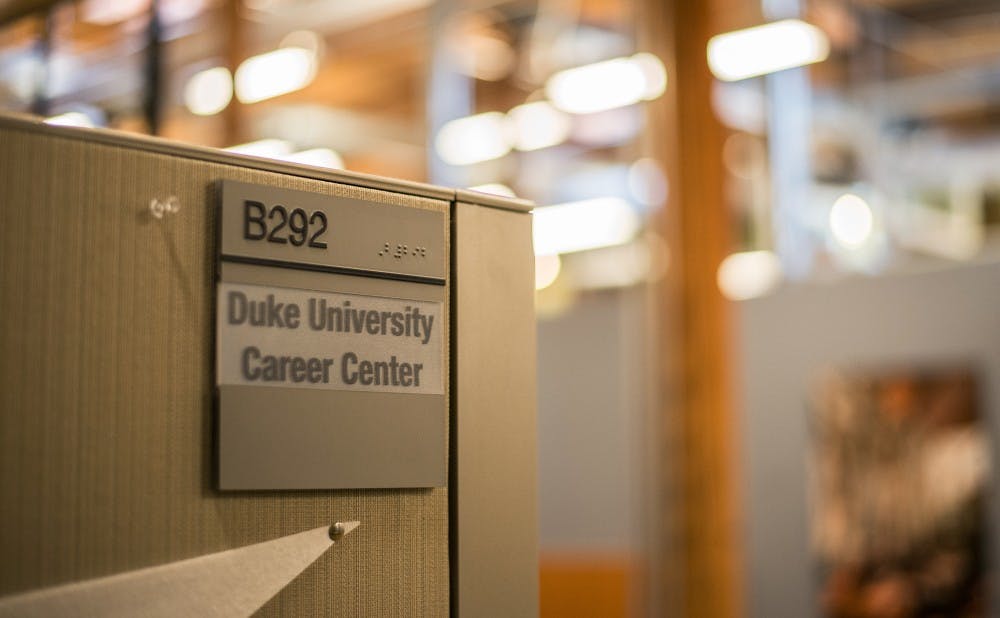Although adjusting to a fully virtual recruiting environment presents both challenges and opportunities, the Duke Career Center is lending a hand to students.
For many employers, the pandemic has posed a challenge to recruitment efforts. Most companies use some form of in-person engagement as part of their recruitment strategy, so switching to an all-online strategy on short notice has proven difficult for both students and employers.
Similarly, the Career Center has gone completely online to continue to bridge gaps between students and employers. It had previously offered a number of online services to accommodate employers that were not able to make it to campus in past years, allowing it to quickly transition to an all-online model in the wake of the COVID-19 pandemic.
According to Anne Lyford, associate director of employer relations at the Career Center, the key to the success of the Career Center’s online programs lies in three areas: technology, education and preparation.
This fall, recruiting activities such as interviews that are organized through the Career Center were all held in an online format. Most companies used their own videoconferencing technology to conduct their interviews with Duke students. The Career Center also encouraged employers to host all interview rounds virtually, whether the employers scheduled these interviews through the Career Center office or on their own.
However, an online setting isn’t optimal for interviews, according to Lyford.
“For a student engaged in an interview process, it may be more challenging to learn about an organization’s culture and assess fit with an organization through an entirely virtual process that doesn’t allow for seeing the office or meeting employees face to face,” Lyford wrote in an email.
The Career Center has recently adopted new forms of technology to enhance its services. For example, Big Interview is a preparation tool that allows students to do mock interviews and receive helpful feedback on their answers. The program also offers three different prep curriculums depending on how much time the student has to prepare.
Another newly-adopted program is Interstride, which offers services for international students. The program offers job search and networking tools, as well as webinars and immigration support that help international students to smoothly transition into a new work environment.
The CareerConnections system also allows students to search and apply for jobs, schedule meetings with career advisors and view upcoming events at the Career Center.
Meanwhile, education programs promote getting information from employers to students. Virtual information sessions allow employers to talk to students about their company and current job opportunities.
The format of the session is decided by the employer and can vary widely, from an employee and alumni panel to a simulation of typical job duties.
“It’s a good way for students to learn firsthand in a no-pressure environment about what it’s like to work at a particular organization and the opportunities available,” Lyford wrote.
In terms of preparation, the Career Center focuses on keeping students informed about job opportunities and preparing them for success in those roles. They hosts career prep videos, short courses, workshops and various other practice events to give students opportunities to engage with the professional world and acquire critical skills.
Virtual recruitment replaces some of the usual in-person events that companies host at Duke, and provides alternative opportunities to engage with and make connections in the business world.
“The opportunities are still out there; we just have to be proactive in finding them,” sophomore Derek Chen said. “Now with online interviewing, the process, or at least the interviewing part, is less stressful than ever because I don’t have to put on the full suit, since the entire process has been streamlined via Zoom.”
Employers and alumni too are excited and “want to meet, provide support and recruit Duke students,” Lyford said in an interview.
The Career Center has been able to engage more alumni in their virtual events, including virtual career fairs and industry exploration panels, as getting people to come to virtual events is easier.
In the spring, Career Center services will remain virtual for students and employers. The Center is working on hosting several networking events throughout the spring in the areas of arts, nonprofits, government and startups.
“We are also being very intentional around keeping lines of communication open among students and employers as we seek feedback to help us adjust services along the way to meet their needs,” Lyford wrote.
Get The Chronicle straight to your inbox
Signup for our weekly newsletter. Cancel at any time.

